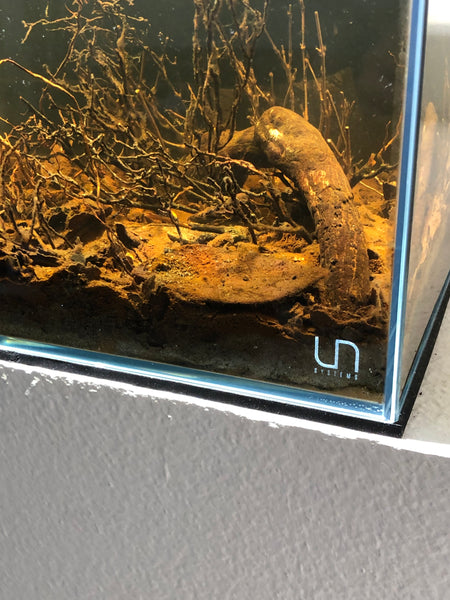- Continue Shopping
- Your Cart is Empty
No magic here.
After years of experimenting with leaves, botanicals, and other natural materials in aquariums, and with a growing global community of hobbyists doing the same daily, the mental roadblocks to this approach are starting to fall. We're seeing all sorts of tanks being created by all sorts of hobbyists, which in years past would garner far more hushed whispers and criticisms than any gasps of envy.

With all of the newcomers to our world, you'll inevitably find some confusion or misunderstanding about how these systems, filled with decomposing seed pods and leaves and such, are managed. Some think that these systems and their natural microbial /fungal populations render any concerns about accumulating organics irrelevant, and that you can relax on maintenance practices.
Others are concerned that the very structure of botanical-style aquariums renders them "ticking time bombs", teetering on the brink 24/7, ready to "crash" at a moment's notice. As with so many things in aquarium-keeping, the truth lies somewhere in between.

It boils down to observing many basic tenants of aquarium keeping. Like, as much as you'll see me occasionally throw shade on some long-held aquarium practices and beliefs, most of what we do in our world is based upon time-honored techniques of husbandry and such...because they work.
Don't assume that, because we accept and foster some unusual natural processes, we categorically eschew the basics of aquarium keeping.
I may "trash talk" mindset and bad attitudes, but I will never downplay the virtues of stuff like regular water exchanges, proper stocking, feeding, and observation of our aquariums. This stuff is fundamental. And it always makes me laugh that, when contemplating trying any new type of approach to aquariums, a certain percentage of hobbyists almost always feel that this is the one which somehow exempts them from the basics of aquarium husbandry! It's almost predictable.
Why is that?
I wish I knew.
And some of the generic descriptors we use in our practice might very well gloss over some of the subtle nuances...stuff that we all should have a basic understanding of.

Need an example?
The moniker "organics" that we have used as a metaphoric "red flag" to discourage throwing this stuff into tanks in years past is still important to understand. Not all organics are bad. "Organics" are defined as natural matter or compounds with a carbon base...That pretty much covers everything, right? Stuff like nitrogenous compounds, however, are detrimental to aquarium water quality when they accumulate in excess over time.
No "approach" to aquarium-keeping will render your aquarium completely immune to these negative impacts. A well thought-out, well-managed botanical-style aquarium can manage nutrient inputs and exports effectively. The key is balance. It's about making sure that you have a means to utilize or export excess organics in place, such as a healthy and diverse population of bacteria, fungal growths, micro-crusataceans, etc. in place.
These organisms, when coupled with common sense, tried-and-true methods of aquarium management, help you create a stable, healthy aquarium for the long run.

And sure, dissolved organics can accumulate and even be problematic in any kind of aquarium- if you don't have necessary control and export processes in place to deal with them. What would these processes be?
Well, to start with: Proper stocking. Careful feeding. Decent water movement and filtration, to physically remove any uneaten food and excess fish wastes. Use of some chemical filtration media, such as organic scavenger resins, which tend not to remove the "tint", but act upon specific compounds, like nitrate, phosphate, etc.
And of course, water exchanges. Yeah, the centuries old, tried-and-true process of exchanging water is probably the single most important aspect of nutrient control and export for any system, traditional, botanical, etc. There is no substitute for diluting organic impurities through regularly-scheduled water changes, IMHO.
Nothing crazy here, huh? Like, this is pretty much "Aquarium Keeping 101", right?
This isn't some revelation.

I'll say it yet again: In my experience, there is nothing inherently more challenging or more dangerous about these types of tanks than there is with any other speciality system. The fact that the water is brown doesn't mean that a well-managed tank is any closer to disaster than any well-managed clear water system.
There's no magic here.
We simply need to do the work necessary to keep our aquariums operating in a healthy state. Nope, nothing new here. In my opinion, NO aquarium of ANY type is "set and forget"; do that and you'll be in for a rude awakening with a blackwater, botanical-style tank- or any tank. You simply can't take that approach in this hobby, IMHO.
That being said, I commend many of you for forging ahead with new ideas and this approach that might not be familiar to you. Moving from the theoretical to the functional takes some courage, imagination, and most of all..impulse. When it comes to trying out exotic new concept aquariums, guys like me (as you all know by now) just need to get the damn thing started and stop musing on about it.

Others go full speed ahead...damn the torpedoes! These people are awesome.
Regardless, self-awareness is important! I think it's in my nature to get a bit too deep into the planning. The challenge for me is not to get so bogged down in an endless cycle of "analysis paralysis" that I never get projects off of the drawing board!
Don't get into this rut, okay? Understand what's involved, what's required of you as a hobbyist, and simply move forward.

Just remember one thing:
It's not a "plug-and-play" proposition. It requires some effort, thought, observation, and patience...
So, yeah...I'm glad you're here. Glad you made that mental shift...and have the courage to try something that might be new for you!
Enjoy. Learn. Practice. Explore. Share.
Stay thoughtful. Stay creative. Stay relentless. Stay undeterred. Stay diligent...
And Stay Wet.
Scott Fellman
Tannin Aquatics






Scott Fellman
Author